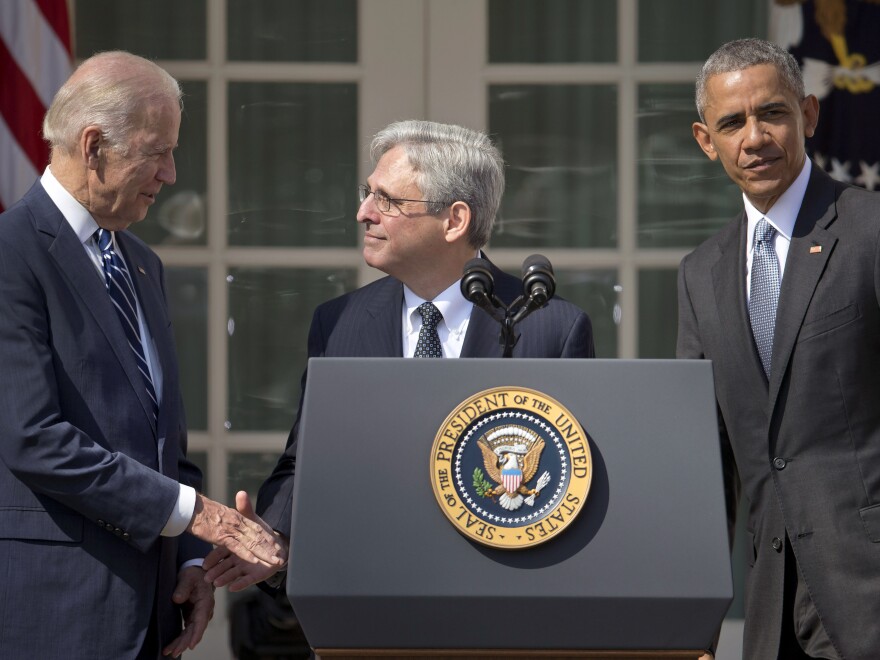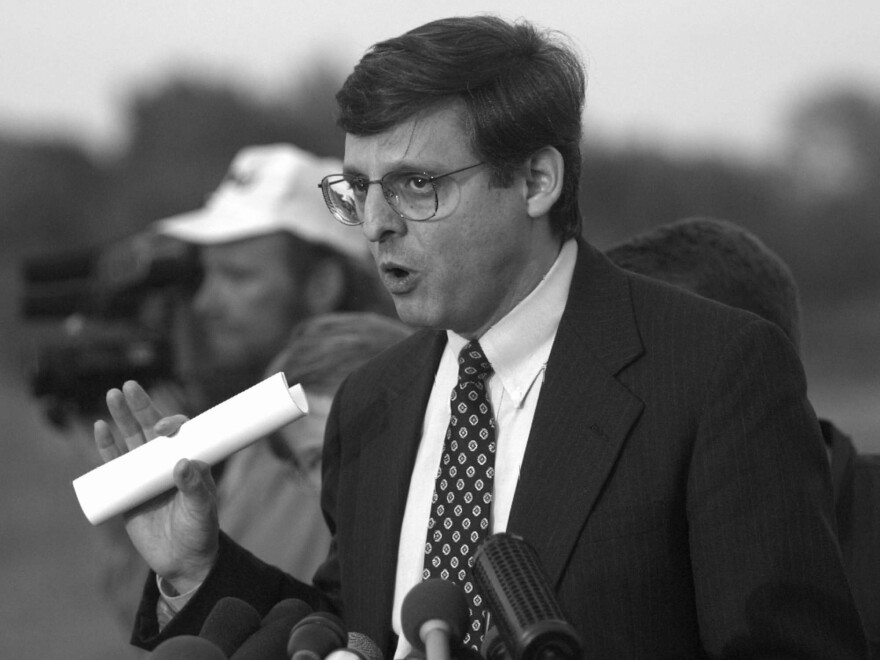Most people know Judge Merrick Garland for what didn't happen to him. Five years ago, the Senate never acted on his nomination to the Supreme Court.
This week, that will change, as a new chapter begins in Garland's lifelong commitment to public service. Garland, 68, will appear before the Senate Judiciary Committee on Monday as President Biden's pick to serve as attorney general. This time, few obstacles stand in his path to confirmation. But the institution he's likely to join operates largely in a state of shock.
The Justice Department is still reeling from political scandals from the Trump years — and racing to neutralize the threat from homegrown, violent extremists who participated in the attack on the U.S. Capitol. Over a legal career that spans 44 years, Garland has confronted those kinds of problems before. It's one of the many reasons the White House selected him to serve as the nation's top law enforcement officer.
"Having a well-respected judge as attorney general will help get the department out of the quagmire of partisan politics that many people think it devolved to under President Trump and Attorney General [William] Barr," said Georgetown University law professor Paul Butler.
Early years and Hollywood inspirations
After clerking for Justice William Brennan on the Supreme Court, Garland took a job as an adviser in President Jimmy Carter's Justice Department. In those years after the Watergate scandal, department leaders struggled to separate partisan influence from law enforcement and establish new boundaries for the FBI. Some of the biggest investigations of that era, in which Garland played a bit part, later found their way onto movie screens.
"American Hustle, about the Abscam case; Argo, about the exfiltration of hostages in Iran; and most important, the Miracle on Ice, which was about the Lake Placid Olympics, where I did work on the security for the Olympics," Garland recalled to an audience at his alma mater, Harvard Law School, in 2016.
Garland told former Harvard Law School Dean Martha Minow he didn't start out with his mindset on the law. Rather, he wanted to help people one on one, so he planned to become a doctor. But his collision with chemistry and math spun him toward the legal profession, where he has searched to build that sort of direct connection ever since.

In the mid-1980s, Garland became a rising star at the Arnold & Porter law firm in Washington, D.C. Unusual among his peers, he made time for a young college graduate, Randy Thompson, who worked in the firm's copy center. Thompson said Garland reviewed one of his papers, photocopied it and rearranged the paragraphs.
"That was the beginning of, in essence, him becoming a writing coach for me, and it was just extraordinary experience, and he became my coach, eventually my mentor and, 30-something years later, a friend," Thompson said.
Eventually, Garland wrote him a reference for law school, attended his graduation and has kept in touch ever since. Thompson said Garland is still a little old-school, still humble and still looking to help.
"The only thing that really has changed about him, and I guess me as well, is the color of our hair," he said with a laugh.
A return to government
Garland spent several years at the firm, before a judge advised him that he was "wasting his life" and should rejoin the government instead, as Garland put it in his Harvard remarks. He took that advice, and by the early 1990s, Garland was prosecuting a violent gang that terrorized people in a public housing project and was helping to advance a case against D.C.'s then-mayor, Marion Barry, on drug charges.
Back inside the Justice Department headquarters, Garland became the man to see for the hardest problems. On April 19, 1995, a truck bomb tore apart the federal building in Oklahoma City, killing 168 people. Former Deputy Attorney General Jamie Gorelick remembers watching that day, with Garland at her side.
"He basically said, while watching children being pulled out of the wreckage, that he had to go," Gorelick said. "He really wanted to go. We both had young children at the time, and what we saw on those screens was so affecting."
Garland would soon travel to the site of the deadliest domestic terrorism attack in American history. He oversaw the search warrants, protected the chain of evidence and insisted that reporters have access to court proceedings.
"We wanted somebody who could make sure that the investigation was done by the book and that any indictment was bulletproof," Gorelick said.

Prosecutors later convicted Timothy McVeigh and Terry Nichols for their role in that bombing.
Former prosecutor Beth Wilkinson said Garland played an important role in other confrontations with extremists in those years, including a lengthy 1996 standoff with the heavily armed Montana Freemen. The Justice Department and the FBI were eager to avoid a repeat of deadly incidents in Waco, Texas, and Ruby Ridge, Idaho, only a few years earlier.
"One of the examples I can think of is sometimes when there were these stand-downs where there would be, you know, arrest warrants for someone or there would be some kind of controversy between people who were challenging the federal government, Merrick's first instinct wasn't to go in and arrest everyone," Wilkinson said. "It was to try — along with the FBI — to see if those disputes could be resolved."
Wilkinson said the FBI went on to arrest the men in the Montana standoff months later. She credited Garland's quick thinking and cool head with preventing what could have been a tragic outcome.
"He's not an ideologue"
Just about the only criticism Garland's nomination has drawn is in the area of civil rights, where his record is less robust.
"Garland is a moderate, so I don't see him as the bold and visionary leader on racial justice that some people were hoping for," said Georgetown's Butler. "That he's not an ideologue is both good news and concerning for people who want an attorney general to meet this moment of national reckoning inspired by the movement for Black lives and the killing of George Floyd."
Butler said he thinks Garland will take his cues on racial justice from the White House. And, he said, the civil rights community will be cheered by other members of the leadership team Biden has announced for the Justice Department, including civil rights advocate Vanita Gupta, nominated to be associate attorney general, and Kristen Clarke, to lead the department's civil rights division.
Wade Henderson, of the Leadership Conference on Civil and Human Rights, said Garland is up to the task. But Henderson said it's a big one.
"The next attorney general, for example, has to do everything in his or her power to fight for voting rights, police reform, criminal justice reform and LGBTQ equality," he said.
Protecting employees
For the past 24 years, Garland has been a federal judge for the U.S. Court of Appeals for the District of Columbia Circuit. In that role, Garland doesn't have much of a chance to share his personal views.
Carolyn Lerner, who once headed the U.S. Office of Special Counsel and now serves as chief D.C. Circuit mediator, said Garland took an early and important lead to update policies that protect employees from sexual harassment and other workplace misconduct.
"I think it's very clear that Judge Garland cares a lot about these issues and he really wants employees to be happy and comfortable in the workplace, and when he was chief judge he took his responsibility to these employees very seriously," Lerner said.
Lerner said Garland wants to continue another of his projects at the Justice Department: tutoring sessions with young public school students.
This year, the judge is working with an 11-year-old boy and his twin sister. Their mom, Andrea Tucker, said Garland plays math games with them on Zoom, sometimes joined by his wife.
"He makes it so interactive for them and so much fun, and they can't get enough of it," Tucker said.
Turns out, it's the kind of public service that Garland has always wanted to do — even if it includes math.
Copyright 2023 NPR. To see more, visit https://www.npr.org.







